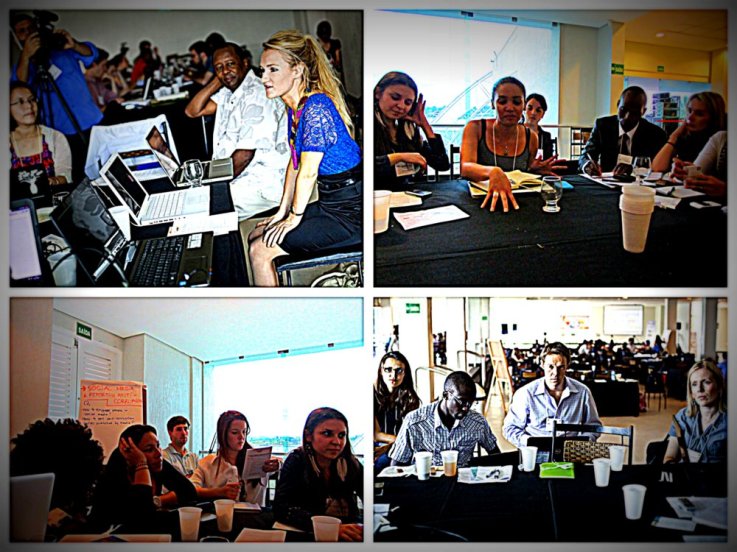 So we all know that media, both the conventional and the new ones, are important to be engaged in social movement to get people to know, care, and act to change the bad situation. But not everyone know how to use it properly. That is why a stall on social media, writing and reporting anti-corruption existed for in the marketplace yesterday.
So we all know that media, both the conventional and the new ones, are important to be engaged in social movement to get people to know, care, and act to change the bad situation. But not everyone know how to use it properly. That is why a stall on social media, writing and reporting anti-corruption existed for in the marketplace yesterday.
Six young journalists around the globe helped to chip in their insights: Bolanie Omisore (Nigeria & USA), Anna Day (USA), Hafawa Rebhi (Tunisia), Rajneesh Bhandari (Nepal), Yolaan Begbie & Nicolette Rehbock (South Africa). Around forty participants took part in the three rounds of session.
Similar questions arose in the rounds:
– How to use social media to engage more audience?
– How to get anti-corruption movement stories published in the conventional media?
– Is social media important to be used in regions with limited internet connectivity?
In an hour, of course it is impossible to answer all the questions and to quench the thirst of knowledge. However, here are the insights shared by the journalists and also by the participants.
Content always matters
– Write something that appeals to people, make it “sexy” for the media: touching, relevant, close to people’s heart, use visuals such as photography, infographics, and videoclips to emphasize your points.
– Use simple language and words. Strip jargons out of your stories.
Conventional media coexists with new media
– Social media is on the rise, but conventional media still plays important role in most part of the world. Embrace and engage both of them.
– Conventional media and offline events can be used to generate and mobilise the audience for your online outlets.
Attracting conventional media
– Understand how the conventional media works: they need to publish stories which will attract more audience.
– Tie your stories with hot contemporary issues.
– Keep your press releases concise, with complete information and written like news (meaning: include all the 5W+1H). Include the phone number, email, and social media details of the contact person.
– Send your press releases and invitations in timely manner, don’t circulate it an hour or a day before the event.
– Maintain good relationships with journalists from various media and platforms.
– Train a small group of your organisation’s members/volunteers on how to face the journalists and to give interviews.
Riding on the social media wave
– Understand how social media works: make something that is interesting to the youth (who are the main users) and easy to share so it goes viral.
– Establish your organisation’s presence and branding in every social media platforms available: facebook, twitter, blog, tumblr, posterous, instagram, foursquare, path, etc.
– Be chatty. Engage your audience in dialogue, ask questions which requires short answers.
– Feature the response of your audience in your social media, for example by retweeting or mentioning them in your twitter, or by inserting their name and responses in your blogposts.
– Use search-engine optimisations (SEOs) in your websites and blogs.
– Include hyperlinks in website pages and blogs.
– Identify influential social media actors and ask for their help. Only coordinate with the ones who have integrity and don’t require you to pay for their participation. Anti-corruption is a moral-sensitive issue so paying the social media actors may be harmful for your cause.
Media in limited internet connectivity
– Resort to more conventional media, such as radio, television of newspapers, but don’t hesitate to build online presence, as with time it will gain more importance as well when more connectivity is established.
– Also use community media which may better serve your audience.
– Bring the social media or your ICT platform to the target audience, for example checkmyschool.org brought laptops with internet modems to be used by the audience to fill the social accountability forms.
Two of the pictures were taken by Virginie Nguyen.
This is crossposted here.


Leave a Reply